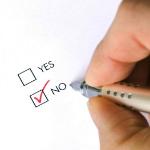Our National Polling Obsession
 Media-sponsored public opinion polls have become the domestic equivalent of WMDs -- weapons of mass disillusionment.
Media-sponsored public opinion polls have become the domestic equivalent of WMDs -- weapons of mass disillusionment.
I am a worrier, and I have been one for as long as I can remember. It is a trait inherited from my parents and grandparents. I worry about loved ones and friends. I worry about my dogs. I worry about the quality of our schools and global warming. I worry that the Redskins will have another dismal season. I worry about lots of things over which I have absolutely no control.
It is no wonder, therefore, that I worry about the health of the American political system.
There are many forces undermining our representative democracy. The culprits range from short-sighted politicians to a disturbingly uninformed electorate. And they most certainly include media-sponsored public opinion polls, which have become the domestic equivalent of WMDs---weapons of mass disillusionment.
Newspapers, TV talk shows, blogs and internet news sites are awash with political polls, which are discussed and dissected ad nauseam by various pundits and “experts”. The current media fixation is with President Obama’s approval rating, which we are told is plummeting. We’re warned that he risks becoming a “failed” President.
A failed president? Already? Oh, please!
Uncomfortable as it may be for some, let’s begin by acknowledging, like him or not, support his policies or not, Barack Obama has actually accomplished a fair amount during his first 18 months in office. His track record of legislative wins---big victories---is impressive. He has also done a good job of conducting two inherited wars. He is about to have his second nominee to the Supreme Court confirmed. Not bad for a guy with a relatively short resume when he announced his candidacy for President in early 2007.
Again, one need not support Obama or his agenda (although I do, more or less), to give him his due on the scoreboard----several hits, a fair number of runs, and a few errors. I didn’t agree with Ronald Reagan on much, but I knew when he was putting points on the board.
Next let’s stipulate that every President begins courting failure the minute the oath of office is administered. That is part of the job description. Then let’s look at some of the data to be gleaned from the gazillion polls that are conducted and publicized every single day, or so it seems.
In mid-July 2010, President Obama’s average job approval rating was 46.2% approve; 48.2% disapprove. That’s right---a mere two percentage points are enough to declare him a failure.
For kicks, then let’s look a bit deeper into the numbers. Among Democrats the President’s approval numbers hover at about 80%, while Democratic detractors add up to less than 15%. Among Republicans, Obama’s approval rating is about 11% and his disapproval rating is in the mid 80s (now there’s a shock!). Those “scores”, if you will, have been fairly steady for well over a year.
It is true, however, that the President is showing some softness among self-identified “independents”: in January, Barack Obama’s approval rating among these swing voters was 40% and by July it was only 42% (!). But, his disapproval rating went from 38% all the way up to 51%.
Beyond today’s polls it is also instructive---or it should be---to study a little American political history.
In many instances, had public opinion surveys dictated presidential decisions, America---indeed the world---would be a lot different than is the case today. Had polls been determinative, for instance, it is highly doubtful that the U.S. would have come to the aid of Great Britain in its struggle against Nazi Germany in the years preceding our entry into World War II. Franklin Roosevelt chose, after considerable debate, to confront prevailing public opinion and provide assistance to the Brits. Had he not done so, history might well have gone the other way---not a comforting thought.
And, had Harry Truman paid attention to the polls of his day it is virtually certain that the Marshall plan never would have made it from Foggy Bottom to Western Europe in the late 1940s. At the time, Americans were returning to their pre-war isolationist views, and the President’s job approval rating was in the anemic mid-30s. Interestingly, Harry Truman’s poll numbers were never very high---seldom going above the 40% mark. And yet most Americans now consider him to be one of our better (i.e. more successful) presidents.
Other examples of presidential performance are also telling. In early 1961, at the start of his presidency, John Kennedy’s approval rating was in the low to mid-70s. Then came the Bay of Pigs debacle, and JFK’s standing with the public went up, to almost 80%! On assuming office in August, 1974 (after Nixon’s resignation) President Gerald Ford’s approval rating was 60%. He then issued his predecessor a pardon for his role in the Watergate crimes, and Ford’s numbers dropped to under 40%. Many of us who were critical of that pardon, and therefore disapproved of Mr. Ford’s job performance, have since come to realize that he was right and we were wrong.
Is it too much to ask that the pollsters and the pundits back off, and maybe reflect a bit more on what they are doing and saying? Silly me, of course it is.
I do not worry much about the polls having an overly negative effect on Barack Obama (he’s smart enough not to fall into that trap), but I am deeply troubled by their impact on our national conversations, and on our public institutions---including the presidency. I worry about citizens’ expectations; I worry that the constant drumbeat of presidential “failure” will be self-fulfilling. And that leads me to worry about the electorate’s ability to make rational judgments about the big, tough issues we face as a nation. I worry about our collective capacity for self-governance.
My parents and grandparents would be so proud!